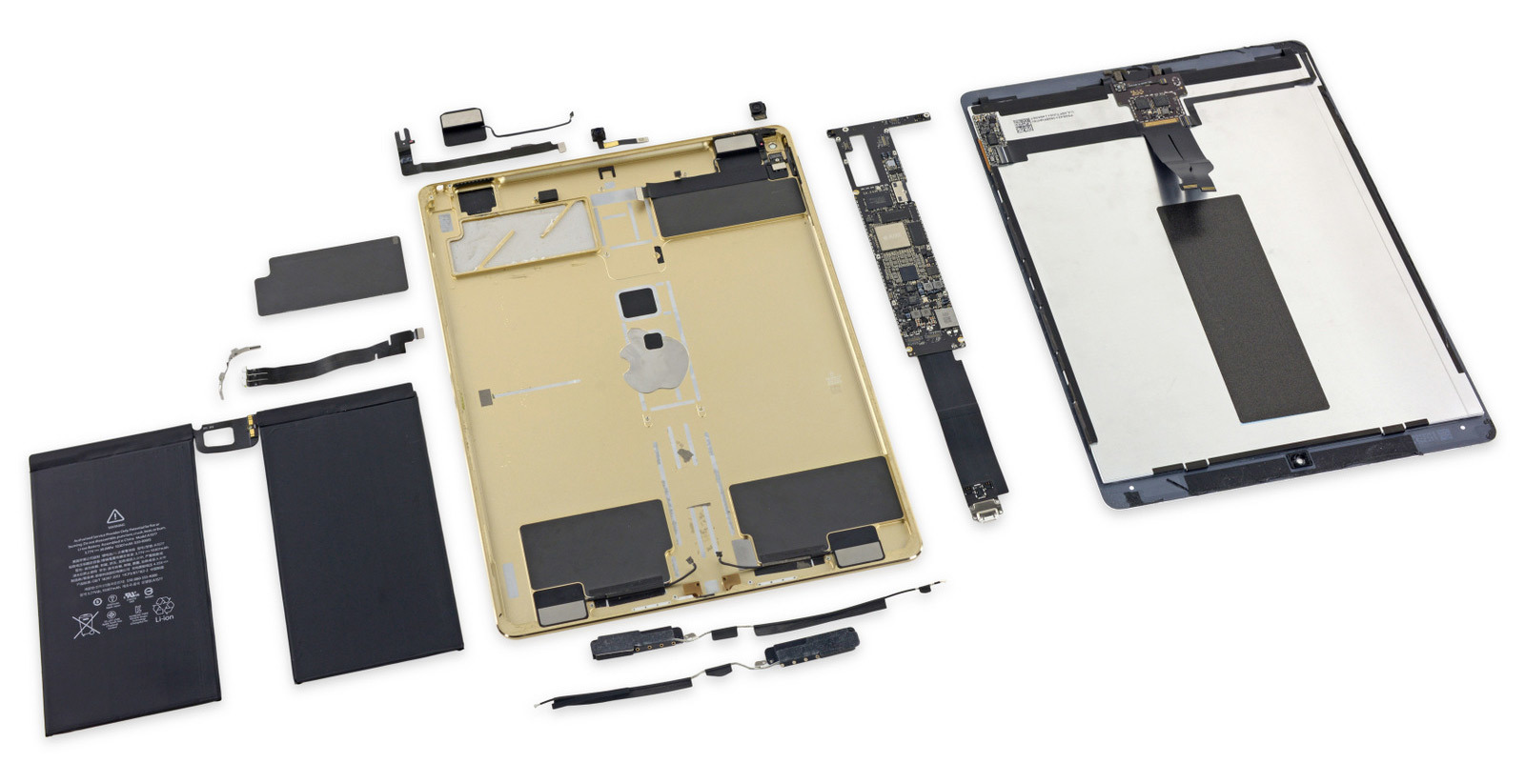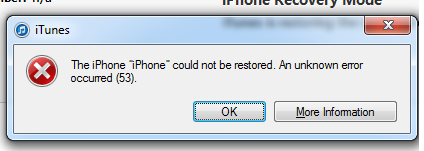Apple blocks free electronics repair laws
The company makes every effort to impede the repair of equipment by unauthorized workshops.

IPad Pro tablet disassembled. Photo: iFixit
On Geektimes, the topic of absurd prices for repairing Apple equipment was repeatedly discussed: replacing cracked glass in the iPhone costs $ 149 , in the iPad Pro - $ 599 (plus shipping), replacing the battery in the phone - $ 79 , replacing the motherboard in the MacBook Air - $ 750 and so Further.
For example, if you got somewhere cheap glass from a third-party manufacturer, then an authorized Apple center will refuse to install it. To make repairs on your own, too, not everyone succeeds: to separate the old glass from the screen, you need to very carefully heat it to a specific temperature when the glue melts at the joints.
The procedure for parsing iPad Pro. Source: iFixit
It is clear that such a procedure is beyond the power of the average public : they simply turn to the company center or buy a new iPad.
Apple earns a lot from selling AppleCare + services, as well as selling branded components ($ 599 for glass to a tablet gives a good margin). The company maintains a closed ecosystem for the repair and maintenance of laptops, smartphones and tablets and effectively squeezes excess profits from consumers who are used to spending large sums of money on Apple equipment and Apple services each year.
Separate engineers try to repair Apple technology on their own, using a spear method and common sense., but Apple strongly recommends that users refrain from contacting "unauthorized centers."

An engineer from the company Rossmann Repair Group checks the resistance of a burnt resistor on the motherboard of a MacBook Air laptop before replacing it.
Moreover, Apple may specifically disable the gadget that has been repaired in an unauthorized center. So, the recent iOS 9 update turned the iPhone 6 into a “brick” if it had a non-original Home button with a Touch ID fingerprint sensor installed in it. In this case, after updating the system, Error 53 occurred (Error 53).

If the user repaired the device with the replacement of components not in the branded center, but somewhere else on the cheap, then his smartphone became inoperative after a software update.
The company later explained that Error 53 is the result of a security check designed to protect users:
“IOS verifies that the Touch ID sensor on your iPhone or iPad exactly matches the other components of the device. If iOS finds a mismatch, the check fails and the Touch ID, including the Apple Pay service, is disabled. This security measure is necessary to protect your device and to prevent the use of fraudulent Touch ID sensors. ”
When the campaign for organizing a class action lawsuit against Apple began , the company apologized , released a quick fix and agreed to pay compensation to the victims. Lawyers believe that the payment of compensation from Apple is due only to the threat of a collective action, nothing more. “They have never revealed before that the phone could be disabled after routine repairs. Apple was going to say nothing about this and force users to buy new products simply because they went to a repair shop, ” said Darrell Cochran, a lawyer representing the interests of the plaintiffs. “They understood that they had been caught.”
The existing status quo completely suits Apple, so it resists the adoption of new laws in the United States that threaten the closed ecosystem of Apple. So far, she has succeeded in lobbying her interests successfully (the “bribing” of US officials is legalized as part of the lobbying procedure).
Apple lobbies its interests on lobbying its interests on this issue much less than it earns from maintaining a closed ecosystem and monopoly overpriced repair prices, so investing in lobbying is justified. As a result, the law was repeatedly inhibited in several states.
As lobbying is legalized, information on the financing of officials is indicated in official government documents. The journalists of The Huffington Post interviewedwith the initiators of such bills in two states, and those showed official government records that indicate funding for opponents of the bill by Apple.
Bills on the "right to repair"tried to hold in four states - Minnesota, Nebraska, Massachusetts and New York. Bills propose to amend the current legislation regarding the sale of electronic equipment. The amendments simplify the repair of equipment in third-party workshops: the manufacturer is obliged to provide all the necessary documentation for such repairs in independent workshops, as well as to provide independent repair shops and individuals with the same software tools and software updates needed for repairs that the manufacturer provides to its select to partners.
The amendments are also intended to reduce the amount of “e-waste” that is usually subjected to a dangerous and expensive shredding procedure in an industrial shredder.and shipped for disposal in third world countries. This is exactly the procedure that Apple technology undergoes, despite the common PR video about a robot that parses “iPhones” .

Electronic garbage at the dump before loading into an industrial shredder. Photo: Ken Christensen, KCTS9 / EarthFix
Proponents of changes in legislation are confident that the “right to repair” will save a lot of money for ordinary people and also help protect the environment from toxic waste. Millions of old laptops, tablets and smartphones will get a second life and will work for many more years instead of replenishing a mountain of “e-garbage”, polluting the soil and stimulating harmful consumerism.
This week, the bill will be put to a vote in the Senate and the Assembly, the two chambers of the New York State Parliament ( text of the Senate Bill S3998A ). Thus, New York may become the first state to adopt these amendments. However, Apple has successfully managed to lobby its interests in past years, so that the adoption of the bill is a big question. This is the second attempt, last year Apple lobbyists managed to block the first version of the bill .
The bill on the “right to repair”, of course, is opposed by other electronics manufacturers, who also want to continue to make money by selling branded components and services of service centers. For example, the Chinese Huawei, following the example of Apple, recently began using proprietary bolts and screwdrivers to impede the repair of their smartphones (and make extra money on selling screwdrivers?).

Pentalobe bolts for the back cover of the iPhone 4, 4S
But none of the other manufacturers can match the financial power and political influence with Apple.
Supporters of the electronics repair bill from the The Repair Association have a trump card: it was precisely this argument that helped to carry out a similar law onThe right to repair cars in independent workshops in Massachusetts in 2014.
The outcome of the lobbying confrontation in New York will be known this week. Surely financial support for lobbyists will not only Apple. For example, in Nebraska, a repair rights bill helped block Verizon. Financial resources can provide other companies.

Instructions for self-repair iPhone on the website iFixit, which is one of the founders of The Repair Association
Apple does not comment on the bill in the state of New York and its participation in the financing of lobbyists. Apparently, the official position of the company's lawyers, if such appears, will be based on the right to protect their intellectual property, and not on preserving the profit margin. At the very least, the Consumer Electronics Association, which expresses the interests of manufacturers and in which Apple is a part, has already stated that these bills put “proprietary information that belongs to manufacturers” at risk. During the consideration of the bill in Minnesota, which was eventually blocked, a representative of the Consumer Electronics Association said: “For example, this proposal could allow anyone to impersonate himself as a repair shop to reverse engineer such a device and release counterfeit goods.
Problems with the repair of technology Apple arise not only in the United States, but also in Russia. For example, a few days ago, the Basmanny Court of Moscow registered a lawsuit against the Irish company Apple Distribution International, the Russian office of Apple Apple rus, the re-store reseller and the company Edzasters Pro. The plaintiff paid for the purchase of free non-warranty repair service (10% of the cost). When he damaged the display of the iPhone, Apple's support service refused to repair, citing the fact that the original displays are not supplied to Russia. He was offered to replace the smartphone subject to additional payment of 25,990 - 29,300 rubles. Lawyers believe that there is a clear violation of the law on consumer protection, because the manufacturer must be responsible for the service.
Note that in the Russian case, even speech is not about repairing the iPhone in a third-party workshop or using third-party components, but this would be quite appropriate with the usual replacement of cracked glass.
See also:
“ How unauthorized idiots repair Apple laptops ”
